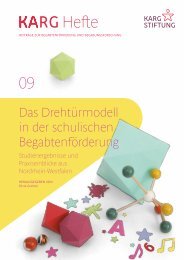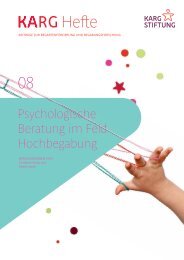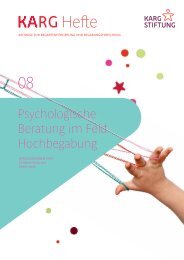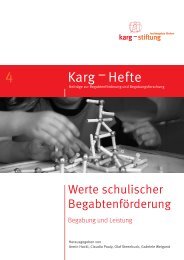FAQS: Frequently asked questions about giftedness
The Karg Foundation receives a lot of questions on the subject of giftedness—FAQs (Frequently Asked Questions)—far more often indeed than it did ten years ago. And this is a good thing! Many people involved in the educational processes of children have come to realize that giftedness can also be a fundamental personality trait of children and adolescents. The Karg Foundation wants to answer the questions you may have not only as educational and psychological professionals in educational institutions or working as educational providers, policy makers, or in training and further education institutes, but as parents and gifted people also: What is giftedness? How can it be identified? Who can provide advise for gifted children and their families? How can they be supported in the best possible way?
The Karg Foundation receives a lot of questions on the subject of giftedness—FAQs (Frequently Asked Questions)—far more often indeed than it did ten years ago. And this is a good thing! Many people involved in the educational processes of children have come to realize that giftedness can also be a fundamental personality trait of children and adolescents.
The Karg Foundation wants to answer the questions you may have not only as educational and psychological professionals in educational institutions or working as educational providers, policy makers, or in training and further education institutes, but as parents and gifted people also: What is giftedness? How can it be identified? Who can provide advise for gifted children and their families? How can they be supported in the best possible way?
You also want an ePaper? Increase the reach of your titles
YUMPU automatically turns print PDFs into web optimized ePapers that Google loves.
What is intelligence?<br />
“Intelligence is a very general mental capability that,<br />
among other things, involves the ability to reason, plan,<br />
solve problems, think abstractly, comprehend complex<br />
ideas, learn quickly and learn from experience. It is not<br />
merely book learning, a narrow academic skill, or test-taking<br />
smarts. Rather, it reflects a broader and deeper capability<br />
for comprehending our surroundings—‘catching on’,<br />
‘making sense’ of things, or ‘figuring out’ what to do.”<br />
(Linda Gottfredson, 1997, p. 13).<br />
This quotation makes it clear that intelligence includes<br />
a variety of thinking skills. Typically, these occur<br />
collectively within individuals. For example, someone who<br />
easily grasps complex ideas also learns more quickly from<br />
experience. This phenomenon is referred to as general<br />
intelligence. At the same time, it is possible to distinguish<br />
among these different thinking skills in terms of which<br />
performance they influence and to what extent.<br />
Thus, verbal intelligence primarily influences linguistic<br />
performance, numerical intelligence primarily influences<br />
mathematical performance, and figural-spatial intelligence<br />
influences drawing and design performance. A person’s<br />
individual thinking abilities are not always equally strong;<br />
individual strengths and weaknesses could also become<br />
apparent, and these can be depicted in intelligence profiles.<br />
Profiles that are unbalanced, that is, with specific<br />
individual strengths and—when viewed in comparison—<br />
weaknesses, are more likely to be found in the realm of<br />
high intelligence than in the realm of average intelligence.<br />
“Rather, intelligence reflects a broader and<br />
deeper capability for comprehending our<br />
surroundings —‘catching on’, ‘making sense’<br />
of things, or ‘figuring out’ what to do.”<br />
14 15
















